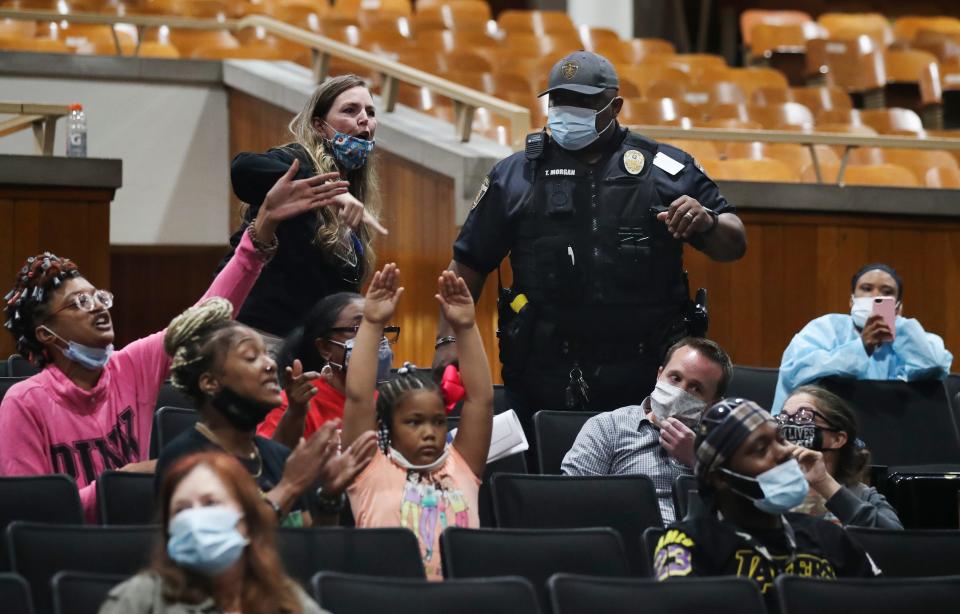Feldkamp: New bill says school board candidates must pick a political party. Is that legal?
Political dividing lines have increasingly shown up at local school board meetings with competing ideologies. We’ve seen protests over which bathrooms transgender students should use, whether or not critical race theory is being taught in our public schools and what books should be allowed in our libraries. Children do not shed values taught at home when they walk into a classroom and they certainly do not shed their troubles. Community issues and so-called “culture wars” will always show up in our schools. But if we are going to have productive conversations with the intent of educating and preparing students for their life ahead, attaching political identity to school board elections is not the way to do it.
Kentucky Senate Bill 50 and its sister bill in the House aim to do just that. The proposed law would require local elected positions that are currently nonpartisan to designate a political party. This includes local school board elections and will “amend KRS 160.200 to require the offices of boards of education to have a partisan primary or partisan election.”
When I asked Angela Billings, Senate Majority spokesperson, why the bill’s sponsor believed party designation would benefit school board elections, she responded, “Offering this information up front provides voters with insight they have been craving about candidates. Designating a party affiliation gives the electorate a snapshot into the philosophy a candidate would bring to their respective office.”
LIST: Here's the latest on key bills from the 2023 Kentucky legislature
Are party designations legal for Kentucky school boards?
In 1989, the Kentucky Supreme Court ruling in Rose v. Council for Better Education, summarized in nine points what constitutes “essential, and minimal, characteristics of an efficient system of common schools.” Of which, point six reads, “Common schools shall be monitored by the General Assembly to assure that they are operated with no waste, no duplication, no mismanagement, and with no political influence.”
Requiring school board candidates to have a partisan election would fly in the face of this supreme court ruling and undermine the spirit of the job the candidates are hoping to fill.
The capacities required of students in the public education system as laid out in the Kentucky Constitution per KRS 158.645 do not benefit from partisan leanings. Regardless of party affiliation, every person should want all Kentucky children to have the education our state constitution guarantees.
Have something to say about today's news? Submit a letter to the editor here
Political affiliation is a distraction for voters
Declaring a party affiliation can make difficult school board conversations even harder. It's true that regardless of declared political leanings that school board members still bring their ideologies and value sets to meetings. But just because a person votes a certain way does not mean they are incapable of open-minded discourse regarding the issues at hand. However, when school board candidates do run with political designations displayed, some constituents could hitch partisan agendas to board member expectations in hopes that their candidate will stay inside a preconceived box. And those assumptions add partisan pressure that should not exist in a school board.
When we identify people in terms of party-lines we place people into camps and create an us-versus-them atmosphere that only works to dismantle vigorous discussions about our children's education. School board meetings should exemplify the very critical thinking and problem-solving skills we wish to foster in our students. Every stakeholder's highest purpose should be to make sure every child in the school district reaches their fullest potential.
More:Are metal detectors coming to Louisville schools? Most JCPS board members hope so

Which states allow partisan school board elections?
In 41 states and the District of Columbia nonpartisan elections for school boards are required. Four states require partisan elections while five others allow local governments to decide.
The push in recent years for partisan designation in school board races stems from the viewpoint that voters should have a clear idea about what a candidate values. Public policy think tank The American Enterprise Institute wrote in an October 2021 report Sketching a New Conservative Education Agenda that "[T]o boost the signal as to what candidates stand for, school board ballots should allow partisan affiliation to appear next to candidates' names.”
Kentucky legislators seem to be following this playbook and so are our neighboring states. After a law passed in Tennessee in 2021 to allow but not require partisan school board races, more than half of its counties opted for partisan primaries in Aug. of last year.
Meanwhile in Indiana, a bill to require nonpartisan school board candidates to indicate their political affiliation on the ballot last year received a hearing but not a vote. A similar bill has re-emerged this year.
Brigitte Blom is the President and CEO of the Prichard Committee for Academic Excellence here in Kentucky and was a recent guest on the public radio show Cincinnati Edition. She said “To be a member of a school board is to commit to improving education outcomes for students and put them on a path to success. And hopefully that’s the lens through which our voters are evaluating candidates for that job.”
Many believe that politicizing school board elections could bolster voter turnout by lighting the divisive fire that prods people to the polls. However, voting according to political identity does not help improve the educational outcomes of Kentucky's children. Public education in Kentucky, as stated in Rose v. Council for Better Education should always be operated without political influence.

Bonnie Jean Feldkamp is the opinion editor. She can be reached via email at BFeldkamp@Gannett.com or on social media @WriterBonnie.
This article originally appeared on Louisville Courier Journal: Should Kentucky school board elections be partisan? What new bill says

